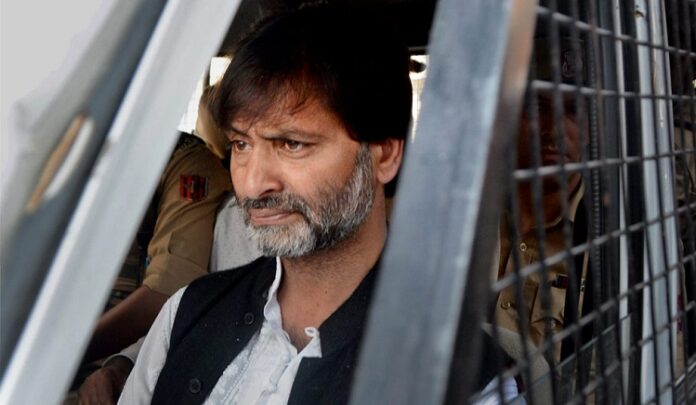On 25 May 2022, a special National Investigation Agency (NIA) court in the Capital of India sentenced life imprisonment to Kashmiri separatist leader Muhammad Yasin Malik. The case against him was registered in NIA in the year 2017 for funding terrorist acts and involvement in a criminal conspiracy. The decision against Yasin Malik ignited protests in some areas of Srinagar and most of the Kashmiri people were angered. Pakistan also condemned the verdict based on a grossly suspicious and bogus case. Indeed, Yasin Malik played a major role in the separatist movement of Kashmir and the court decision is a huge setback to the mission.
Muhammad Yasin Malik is one of the prominent pro-freedom leaders in the territory of Indian-administrated Kashmir. He is the chief of the now-banned Jammu and Kashmir Liberation Front (JKLF). His journey started back in the late 1980s when he crossed into Kashmir with the first group of rebels to launch a separatist movement in the valley. However, he was also among the first fighters who gave up on violence as an option of rebellion. In the year 1994, he announced a unilateral ceasefire and adopted the strategy of India’s founding father Gandhi in the form of a “non-violent struggle for independence”. At that time, the government of India also assured a political solution to the problem and guaranteed to suspend all military-related cases against his group. Yasin Malik did not give up on the movement for freedom at all rather he continued a non-violent struggle to attain sovereignty for the region.
In 2003, Yasin Malik started a significant campaign for the inclusion of Kashmiris in the talks related to Kashmir. His agenda was to involve the people of Kashmir in future talks on Kashmir since they were the ones to get most affected by the decisions. Later in May 2007, Malik kicked off the Safar-e-Azadi campaign meant to strive for the freedom of the Kashmiris. During this time period, he constantly interacted with the Indian government through back-channel talks. He even met with the then Indian Prime Minister in Delhi in 2006 and joined popular television shows to promote his message. Malik married Pakistani artist Mushaal Hussain Mullick in 2009 and the couple became parents to a girl in 2012. He protested in Islamabad in 2013 over the hanging of a Parliament attack convict named Afzal Guru. The NIA registered a case against him in 2017 on the charges of financing terrorism activities, fueling separatist movements, and waging a war against India. JKLF was banned in 2019 and Malik got arrested afterwards.
The life of Malik Yasin portrays a significant shift from gun to Gandhism to attain freedom and liberation. Despite facing numerous hurdles, he continued the struggle to fight for the rights deprived people of Kashmir. The charges against him are fabricated and politically motivated as JKLF released a statement last week against the brutality of the Indian government. Malik famously told the judge during the testimony, “If seeking azadi is a crime, then I am ready to accept the crime and its consequences”. It magnifies the strength and courage of the man to promote the cause he stood for. Although Yasin Malik followed a non-violent route to attain freedom inspired by the ideas of Gandhi, he never compromised on his commitment to representing the oppressed Kashmiri people. On the other hand, India’s stance on Kashmir has been brutal and violent. The country has used force and other psychological means to suppress the freedom voices in the region. India has followed a rigid pathway to dealing with people like Yasin Malik who fortified the movements for freedom and stood against the ruthlessness of the Indian regime. Malik’s conviction is surely a politics of revenge from the Indian side. India aims to separate Kashmiri leaders from the people so that the Indian government can sustain its grip over the region and continue its colonial project. At the same time, it flashes the fascist and nationalist posture of Modi to inflict violence on the Kashmiri Muslims. India is relying on force to curb the decent voices in Kashmir and the verdict on Yasin Malik is a prime example of this approach.
The decision from the Indian court sparked a disagreement among the people in Kashmir and Pakistan. Yasin’s wife tweeted, “Verdict in minutes by Indian kangaroo courts, the iconic leader will never surrender”. The citizens of Indian-administrated Kashmir also showed their support to the leader and protested in the main city of Srinagar. The Indian police fired tear gas and pellets to disperse the people protesting outside Malik’s residence. At the same time, officials of Pakistan’s government also extended their support to Malik Yasin. Foreign Minister Bilawal Bhutto Zardari wrote to the UN Human Rights chief to urge India to acquit Yasin Malik from the charges. The Prime Minister of Pakistan termed the decision a black day for the democracy and justice system of India. In this period of uncertainty, Pakistan ensured the support of silenced people in Kashmir.
The conviction against Yasin Malik is a politics of revenge against the already suffering people of Kashmir. Life imprisonment to the leader is an unfortunate event and a major setback to the efforts for peace in the region. It may result in further uncertainties and instability. The case can only fuel more alienation and separatist feelings. It is a verdict from the Indian courts but not a valid justice. The human rights agencies should take a close look at the issue and take a stance against the fascist Modi regime. Indeed, the peace of South Asia is targeted by the unjust and biased actions of India.




